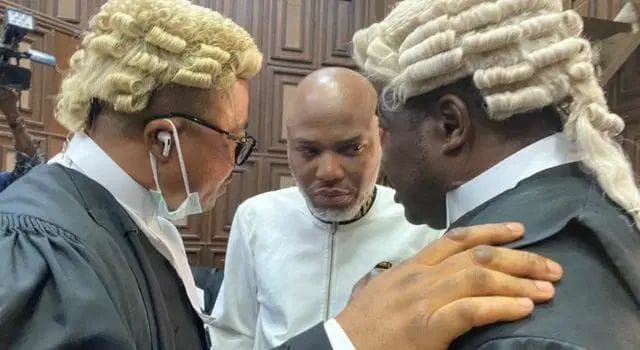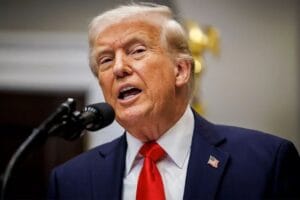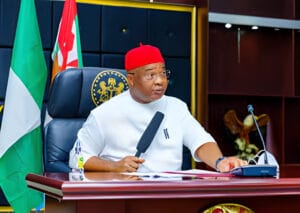The court has moved a step forward in the ongoing case against Nnamdi Kanu, the leader of the Indigenous People of Biafra (IPOB). On Monday, a Federal High Court sitting in Abuja accepted important documents — including the medical report and death certificate of Ahmed Gulak — as evidence.
Gulak, a former adviser to ex-President Goodluck Jonathan, was murdered on May 30, 2021, in Imo State. Prosecutors say his death followed a radio broadcast from Kanu, where he allegedly told supporters to deal with anyone who ignored the IPOB sit-at-home order.
Court Receives Documents Without Objection
The documents were submitted to the court by a prosecution witness. Trial Judge James Omotoso approved the request after confirming there were no objections from Kanu’s legal team. The accepted documents include a death certificate and a police report from Owerri linking Gulak’s death to suspected IPOB members.
Senior Advocate of Nigeria (SAN), Adegboyega Awomolo, presented the evidence in court. He also submitted a police report that indicated gunmen tied to IPOB were involved in Gulak’s killing.
Defence Challenges DSS Video
However, the defence team, led by SAN Kanu Agabi, raised concerns about a video presented by the Department of State Services (DSS). According to Agabi, the video, which showed Kanu being questioned, lacked transparency. He noted that only Kanu and his team were visible, casting doubt on the footage’s credibility.
The DSS witness claimed the video showed their usual procedure. Still, when asked specific questions, he could not remember if he had worn a mask during the questioning.
Defence Requests More Time
Kanu’s lawyer told the court that the defence had not yet received certain police documents they had asked for, which they believe are crucial to their case. Agabi, therefore, asked for a delay in proceedings.
But the prosecution opposed the request. Awomolo said the defence was trying to slow down the trial. He reminded the court that a fast trial had already been ordered. He also mentioned that five more witnesses were ready to testify against Kanu.
Judge Allows Delay in the Interest of Justice
Despite the dispute, Justice Omotoso allowed the adjournment. He explained that while the law calls for quick hearings, the court must also be fair to both sides.
Before adjourning, the judge asked about reports that the DSS had stopped Kanu’s lawyers from visiting him. Agabi denied this, stating that he had arrived at the DSS office earlier than scheduled.
The judge then criticized Aloy Ejimakor, one of Kanu’s lawyers, for making a social media post accusing the DSS of blocking their visit. He warned all lawyers to avoid sharing unconfirmed information online.
IPOB Leader’s Legal Journey So Far
This case against Nnamdi Kanu has a long history. He was first arrested on October 14, 2015, after returning to Nigeria from the UK. The court granted him bail on April 25, 2017, for health reasons. He left Kuje prison on April 28, 2017.
But things took a dramatic turn when soldiers stormed his family home in Afara Ukwu Ibeku, Umuahia. Several of his followers died during the incident. Kanu fled the country during the raid.
On June 19, 2021, Kanu was arrested again in Kenya and brought back to Nigeria on June 27, 2021. Since June 29, 2021, he has been in the custody of the DSS.
Legal Victories and Setbacks
The federal government filed 15 charges against Kanu. However, on April 8, 2022, the court dropped eight of those charges for lack of evidence.
Later, on October 13, 2022, the Court of Appeal in Abuja ordered Kanu’s release and canceled the charges altogether. But the federal government took the case to the Supreme Court. They also got the Court of Appeal to pause the release order while the appeal was being decided.
On December 15, 2023, the Supreme Court overturned the lower court’s ruling. This allowed the government to continue Kanu’s trial on seven remaining charges.
What Happens Next in the IPOB Case
The next hearing in the case is set for May 21. The court will continue reviewing the evidence, and more witnesses will take the stand. The prosecution is expected to present more details linking Kanu to actions of IPOB members.
Many Nigerians are watching the case closely, as it could set a legal precedent on how the government handles issues involving separatist movements.
What This Means for IPOB and Nigeria
The legal battle is more than just a courtroom matter. It raises questions about national unity, freedom of speech, and how the government deals with dissent.
Supporters of IPOB say Kanu is being unfairly targeted. Critics believe he must face justice for the violence they link to IPOB’s actions.
Either way, the case is a test of Nigeria’s legal system and its ability to deliver fair judgment amid strong emotions and political pressure.
Frequently Asked Questions (FAQs)
Q: What is IPOB? A: IPOB stands for the Indigenous People of Biafra. It’s a group that advocates for the independence of the southeastern region of Nigeria.
Q: Who was Ahmed Gulak? A: He was a political adviser to former President Goodluck Jonathan. He was killed in Imo State in 2021.
Q: Why is Nnamdi Kanu on trial? A: The government accuses him of terrorism-related charges, mostly tied to his role as IPOB’s leader and alleged violent activities linked to the group.
Q: What did the court decide recently? A: The court accepted Gulak’s death certificate and other documents as evidence. The next hearing is set for May 21.
Q: Was Nnamdi Kanu denied visits from his lawyers? A: The court found no proof that the DSS stopped his lawyers. The issue arose from a misunderstanding about the visit time.
Q: What is the current charge against him? A: Seven charges remain, as confirmed by the Supreme Court in December 2023.
Stay tuned as the case continues to unfold. More revelations are expected as the trial progresses, and Nigerians await the court’s final judgment.




